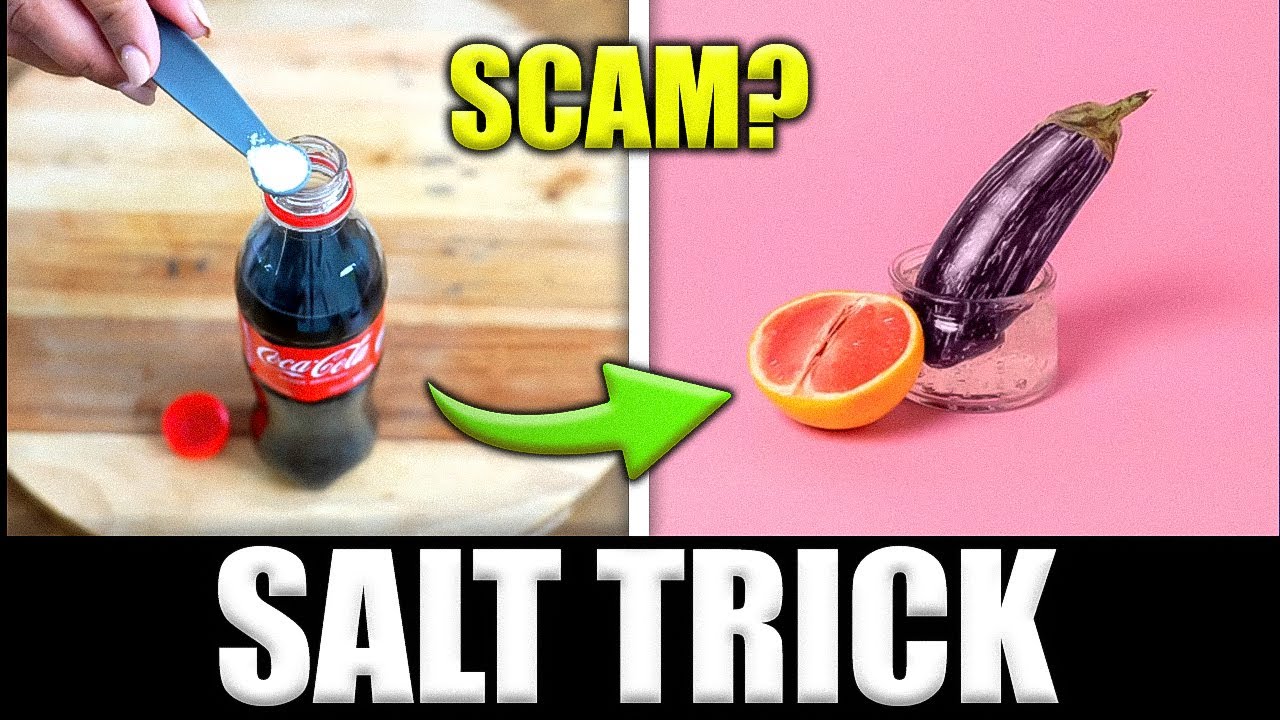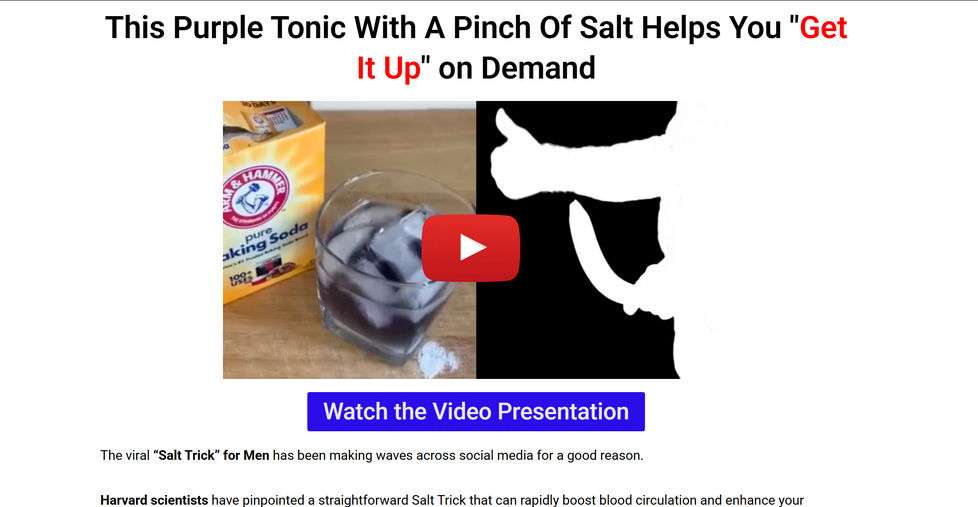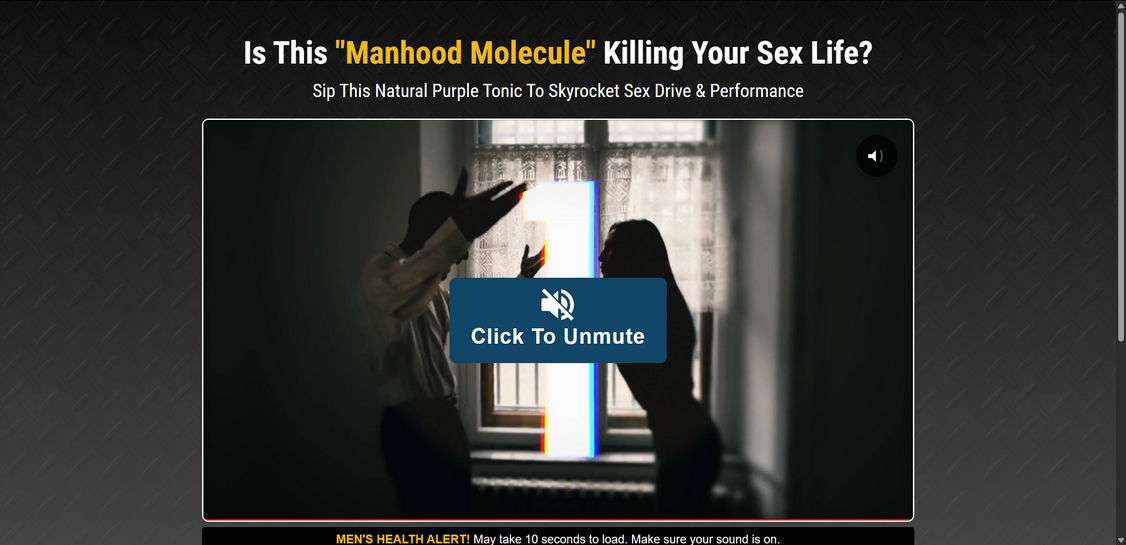Is Salt Trick A Scam? Separating Fact From Fiction
Let’s be honest here, folks—there’s a lot of noise out there when it comes to quick fixes and DIY hacks. But one of the most talked-about tricks recently is the so-called “salt trick.” Some people swear by it, while others are skeptical. So, is this salt trick legit or just another scam? Let’s dive deep into the details and find out once and for all. If you’ve been wondering whether the salt trick is worth your time, you’re not alone. This article will break it down step by step so you can make an informed decision.
Now, before we get too far ahead of ourselves, let’s talk about why the salt trick has become such a hot topic. Whether it’s about cleaning, health, or even weight loss, people are always on the lookout for simple solutions that don’t break the bank. The salt trick promises exactly that—cheap, easy, and effective. But is it too good to be true? That’s what we’re here to figure out.
Before we jump into the nitty-gritty, let me just say this: not everything you read online is gospel truth. While the salt trick might work wonders for some, it could also be a total waste of time for others. By the end of this article, you’ll have all the information you need to decide if it’s something worth trying or if you should skip it entirely.
What Exactly Is the Salt Trick?
Alright, let’s start with the basics. The salt trick, in its simplest form, involves using regular table salt (or sometimes sea salt) to achieve certain results. These results vary depending on the context, but the most common claims include:
- Cleaning tough stains
- Boosting metabolism
- Detoxifying the body
- Relieving sore throats
- Improving skin conditions like acne
Sound familiar? Chances are, you’ve come across at least one of these claims online. But here’s the kicker—does any of it actually hold up under scrutiny? We’ll explore each of these claims in detail later, but first, let’s take a closer look at the origins of the salt trick.
Where Did the Salt Trick Come From?
Like many viral trends, the salt trick seems to have originated from a mix of old wives’ tales, traditional remedies, and modern-day social media hype. Salt, as you probably know, has been used for centuries in various cultures for its preservative and healing properties. Ancient Egyptians, Greeks, and Romans all praised salt for its ability to clean wounds, preserve food, and even purify the air.
Fast forward to today, and salt is still regarded as a versatile household item. It’s cheap, readily available, and most importantly, safe to use in moderation. But somewhere along the line, people started experimenting with salt in ways that weren’t exactly backed by science. And that’s where things get tricky.
Why Has the Salt Trick Gained So Much Attention?
The rise of social media platforms like TikTok, Instagram, and YouTube has played a huge role in popularizing the salt trick. Videos showing dramatic before-and-after results have gone viral, sparking curiosity and skepticism in equal measure. People love quick fixes, especially if they involve everyday items like salt. It’s no wonder the salt trick has captured the imagination of so many.
But here’s the thing—just because something looks impressive on camera doesn’t mean it’s scientifically valid. That’s why it’s important to approach these claims with a healthy dose of skepticism. Let’s dig deeper into the science behind the salt trick and see if it lives up to the hype.
Does the Salt Trick Work? The Science Behind It
When it comes to evaluating the effectiveness of the salt trick, it’s essential to look at the science. Does salt really have the power to clean stains, boost metabolism, or detoxify the body? Let’s break it down claim by claim.
Claim #1: Cleaning Tough Stains
One of the most popular uses of the salt trick is for cleaning tough stains, particularly on clothes and surfaces. Salt’s abrasive nature makes it an effective scrubbing agent, and its ability to absorb moisture helps lift stains from fabric. In this context, the salt trick is actually quite legitimate. Many professional cleaners recommend using a salt-water solution to remove stains caused by spills, sweat, and even blood.
However, it’s worth noting that not all stains are created equal. While salt may work wonders on certain types of stains, it might not be as effective on others. For example, oil-based stains require a different approach altogether. So, while the salt trick can be helpful for some cleaning tasks, it’s not a one-size-fits-all solution.
Claim #2: Boosting Metabolism
Now, let’s talk about the more controversial claim—that the salt trick can boost your metabolism. Proponents of this idea argue that consuming small amounts of salt on an empty stomach can kickstart your digestive system and increase calorie burn. But is there any truth to this?
According to nutrition experts, the relationship between salt and metabolism is more complex than it seems. While salt does play a role in regulating electrolytes and maintaining fluid balance, excessive salt intake can lead to dehydration and increased blood pressure. In fact, the American Heart Association recommends limiting daily sodium intake to no more than 2,300 mg, with an ideal limit of 1,500 mg for most adults.
In short, while a little salt might not harm you, relying on the salt trick to boost your metabolism is probably not the best idea. A balanced diet and regular exercise are still the most effective ways to achieve long-term metabolic health.
Claim #3: Detoxifying the Body
Another common claim associated with the salt trick is that it can help detoxify the body. Detox diets and cleanses have been around for years, promising to rid your system of toxins and improve overall health. But does the salt trick deliver on these promises?
Unfortunately, the answer is no. The human body is already equipped with a highly efficient detoxification system, including the liver, kidneys, and immune system. These organs work tirelessly to filter out harmful substances and keep your body functioning optimally. Adding extra salt to your diet won’t enhance this process—in fact, it might do more harm than good.
Excessive salt consumption has been linked to a range of health issues, including hypertension, heart disease, and kidney problems. So, unless you’re dealing with a specific medical condition that requires increased salt intake, it’s best to stick to a balanced diet and let your body do its job.
Common Myths About the Salt Trick
As with any popular trend, the salt trick has spawned its fair share of myths and misconceptions. Let’s debunk some of the most common ones:
- Myth #1: Salt can cure acne overnight. While salt does have mild antiseptic properties, applying it directly to your skin can cause irritation and dryness. For best results, stick to proven skincare products and consult a dermatologist if needed.
- Myth #2: Drinking salt water is a safe way to lose weight. Drinking excessive amounts of salt water can lead to dehydration, electrolyte imbalances, and even kidney damage. Weight loss should always be approached through a balanced diet and exercise.
- Myth #3: Salt is a miracle cure-all. While salt has its uses, it’s not a magic bullet for every health issue. Always seek professional advice before trying any new remedy.
Why Do People Believe These Myths?
Human beings are naturally drawn to simple solutions, especially when it comes to health and wellness. The idea that something as basic as salt can solve complex problems is appealing, but it’s also misleading. Social media influencers and unverified sources often contribute to the spread of misinformation, making it harder for people to separate fact from fiction.
That’s why it’s crucial to do your own research and consult reliable sources before trying any new treatment or remedy. Your health is too important to leave to chance.
How to Use the Salt Trick Safely
If you’re still curious about trying the salt trick, here are a few tips to ensure you do it safely:
- Always use food-grade salt, such as table salt or sea salt.
- Limit your intake to small amounts, especially if you have high blood pressure or other health conditions.
- Avoid using the salt trick as a substitute for professional medical advice.
- Test the salt trick on a small area first if you’re using it for cleaning or skincare.
Remember, moderation is key. While the salt trick can be useful in certain situations, it’s not a replacement for common sense and good judgment.
Expert Opinions on the Salt Trick
To get a more balanced perspective on the salt trick, we reached out to several experts in the fields of nutrition, dermatology, and alternative medicine. Here’s what they had to say:
“While salt does have some practical uses, it’s important to approach it with caution. Excessive salt intake can have serious health implications, so it’s best to use it sparingly and only for specific purposes.” – Dr. Emily Carter, Nutritionist
“As a dermatologist, I wouldn’t recommend using salt as a primary skincare treatment. While it may offer some benefits, it’s not a substitute for proper skincare routines and products.” – Dr. James Wilson, Dermatologist
What Does the Research Say?
Several studies have investigated the effects of salt on health and wellness. While some have found modest benefits, others have raised concerns about its potential risks. For example, a study published in the Journal of Hypertension found that reducing salt intake can significantly lower blood pressure in individuals with hypertension.
On the other hand, a review in the Journal of Nutrition highlighted the importance of balancing sodium levels to maintain optimal health. The consensus among experts seems to be that salt can be beneficial in moderation, but excessive consumption should be avoided.
Conclusion: Is the Salt Trick a Scam?
After examining the evidence, it’s clear that the salt trick isn’t entirely a scam—but it’s also not a miracle cure. While salt does have some practical uses, many of the claims associated with the salt trick lack scientific backing. As with any trend, it’s important to approach it with a critical mind and rely on trusted sources for information.
So, what’s the final verdict? If you’re looking for a quick and easy way to clean stains or add flavor to your food, the salt trick might be worth trying. But if you’re hoping for dramatic health benefits, you’re better off focusing on a balanced diet, regular exercise, and proper medical care.
Before you go, I’d love to hear your thoughts. Have you tried the salt trick? Did it work for you? Let me know in the comments below, and don’t forget to share this article with your friends and family. Knowledge is power, and the more we know, the better decisions we can make about our health and well-being.
Table of Contents
- Is Salt Trick a Scam? Separating Fact from Fiction
- What Exactly Is the Salt Trick?
- Where Did the Salt Trick Come From?
- Why Has the Salt Trick Gained So Much Attention?
- Does the Salt Trick Work? The Science Behind It
- Claim #1: Cleaning Tough Stains
- Claim #2: Boosting Metabolism
- Claim #3: Detoxifying the Body
- Common Myths About the Salt Trick
- Why Do People Believe These Myths?
- How to Use the Salt Trick Safely
- Expert Opinions on the Salt Trick
- What Does the Research Say?
- Conclusion: Is the Salt Trick a Scam?
Tom Hanks Scandal: The Untold Story Behind The Rumors And Truths
Who Is Marc Almond Married To? The Untold Story Behind His Love Life
Josh Gates Hospitalized 2021: The Inside Story You Need To Know

SALT TRICK (⚠️SCAM OR LEGIT?⚠️) SALT TRICK FOR MEN VIDEO WHAT IS THE

Blue Salt Trick Recipe Scam Or Legit? Read This Before Buying

Blue Salt Trick Recipe Scam Or Legit? Read This Before Buying